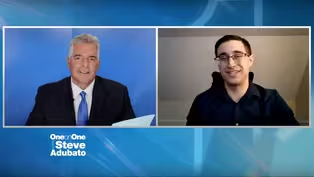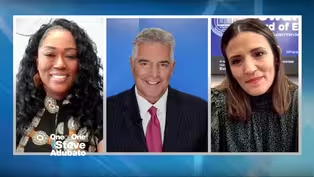One-on-One
The Need for Reentry Programs and Mental Health Support
Clip: Season 2023 Episode 2634 | 8m 38sVideo has Closed Captions
The Need for Reentry Programs and Mental Health Support
Andrea Steinberg, CEO of Jewish Family Service of Atlantic & Cape May Counties, joins Steve Adubato for a conversation about the increased need for mental health support, reentry programs, and the importance of having accessible services for all.
Problems playing video? | Closed Captioning Feedback
Problems playing video? | Closed Captioning Feedback
One-on-One is a local public television program presented by NJ PBS
One-on-One
The Need for Reentry Programs and Mental Health Support
Clip: Season 2023 Episode 2634 | 8m 38sVideo has Closed Captions
Andrea Steinberg, CEO of Jewish Family Service of Atlantic & Cape May Counties, joins Steve Adubato for a conversation about the increased need for mental health support, reentry programs, and the importance of having accessible services for all.
Problems playing video? | Closed Captioning Feedback
How to Watch One-on-One
One-on-One is available to stream on pbs.org and the free PBS App, available on iPhone, Apple TV, Android TV, Android smartphones, Amazon Fire TV, Amazon Fire Tablet, Roku, Samsung Smart TV, and Vizio.
Providing Support for PBS.org
Learn Moreabout PBS online sponsorship(upbeat music) - Hi, everyone, Steve Adubato.
We kick off the program with Andrea Steinberg, Chief Executive Officer of Jewish Family Service of Atlantic and Cape May Counties.
Andrea, good to see you.
- Good to see you as well, Steve.
- As we put up the website of your organization, tell us about the work you do and the people you serve.
- So, Jewish Family Service of Atlantic and Cape May Counties is really situated in mostly Atlantic County, but reaching out into Cape May County with an additional office in Cape May.
We have six offices all together and we work to motivate and empower people to realize their potential to achieve their personal goals and enhance the quality of life through a wide range of programming.
We have about 30 program areas and we serve people regardless of their religion, race, gender, sexual orientation, ethnicity, age, or background.
- So the name Jewish Family Service is not meant to imply that you only serve those in the Jewish community.
- Not at all.
So we were established in the early 1900s to serve the Jewish community, primarily older adults, people that were immigrating to the country at that time, but quickly became a go-to agency for all people, primarily people who were low income populations trying to acclimate to a community, any community.
And now we've become a very large organization compared to what we were once in the 1900s, which, early 1900s, which was a volunteer organization.
We now have 180 employees and we're serving about 13,000 people a year.
- Andrea talk about the issue of, the challenge of mental health, there, obviously, there are more and more, I don't even know if there are more cases or more people dealing with mental health issues but there's more attention being given and the need seems greater than ever.
What does your organization do to help those who are struggling dealing with mental health issues?
- Well, let me start by saying, you know, for us it's a little bit of a silver lining of the pandemic.
So we have always served people in need of support around mental health concerns and now everybody, based on the pandemic, is more aware of it.
And so it has illuminated the issue and allowed people to access or even consider accessing help more readily.
So we are now, you know, upping our game in that arena and making sure that those services exist for anybody that needs to access them.
And currently we're able to do that both in-person as well as remotely.
So people who have barriers, continue to have barriers, based on their health or transportation or whatever it may be, we can still serve from their homes.
And we serve from the very young to the very old so toddlers all the way up into older adults.
And we have specialized treatment for people, particularly those that are exposed to trauma in their lives.
- Government funding, you receive government funding?
- So we do receive government funding as it relates to mental health and outpatient services.
We accept Medicare, Medicaid, which are our government funding sources as well as private insurance.
And we do have a sliding scale when we have funding that allows us to offset for people that are uninsured or underinsured.
We do have other government funding for other mental health programs that are more case management related.
So we do support people in the community who live independently, who may have otherwise been living in a hospital or been incarcerated.
So we provide case management services and that is through government funding.
- Corporate and foundation support, because we're a nonprofit, you're a nonprofit, we spend a significant amount of our time raising money.
You do as well.
- We do.
And it is a complex woven budget, I will say.
We work really hard to assure that all of our services continue at the level and I will tell you the level increases each time something happens in our community, so for example, Superstorm Sandy, economic downturn, now pandemic.
Our county, particularly Atlantic County, which is so reliant on the hospitality industry just takes that much longer to recover.
So we work really hard every day to raise dollars whatever that looks like, private individual, foundations, government, and weave it together to assure services can continue.
- Hmm, the other area that really struck me that you and your colleagues are involved in is prisoner reentry.
I mean, people moving from being incarcerated back into the community.
We've done a lot of programming in that regard and it strikes me that it, we're not doing enough to help those who are trying to reenter society from being incarcerated.
Talk about the work that you're doing in that area.
- Yeah, so we are actually situated at the jail in Mays Landing, which is in Atlantic County.
So anybody who is reentering community, our staff meets with and works with them to reenter successfully and with the hopes of not finding themselves back in the jail.
And that can look all different ways.
So somebody might need help because they would otherwise be homeless or they maybe have barriers to employment or challenges with addiction.
So we wrap services around based on what their individual needs are and work to assure that they can live more stable lives in the community.
And I would agree, a lot more work needs to be done in that area.
We've been at it a long time and I'm really proud of the work that we do.
We also co-respond with police in the hopes of being able to not have people end up in jail or prison, but really to get the help they need on the front end and not have to go through the system and then people are much more successful.
- Andrea, we'll put up the website we've been doing throughout this segment.
If people reach out, how accessible are these services?
- So I will say we have somebody answering the phone every business day, which I'm really pleased to be able to continue to do because you don't always get somebody when you reach out.
So we have two full-time people in our access center responding to phone calls and they will connect people to the service.
Often people don't know the service that they need.
They can describe what's going on with them.
And we are really adept at helping them connect both within JFS but also throughout the community because we may not have every service that somebody needs.
Inevitably somebody who, for example, may call for food, which we have a food pantry here onsite, 70% of those people are then connected to another service of JFS.
So as I said, people don't always know all of what they need or how do I identify the program but we'll do that with them.
- Andrea, thank you.
You and your colleagues, you're doing important work every day.
We appreciate your efforts and that's why I wanted to share the information about your organization, particularly those and we're based in northern New Jersey.
You're in the southern part of the state.
We wanna make sure people are aware of who you are and what you do and to make a difference.
Thanks so much, Andrea.
- We appreciate that.
Thank you, Steve.
- You got it.
Stay with us.
We'll be right back.
- [Narrator] One-On-One with Steve Adubato has been a production of the Caucus Educational Corporation.
Funding has been provided by Horizon Blue Cross Blue Shield of New Jersey.
PSEG Foundation.
Kean University.
Holy Name.
New Jersey Sharing Network.
The Healthcare Foundation of New Jersey.
PSE&G, Robert Wood Johnson Foundation.
And by The Fidelco Group.
Promotional support provided by Insider NJ.
And by The New Jersey Business & Industry Association.
- I am alive today thanks to my kidney donor.
I am traveling and more active than ever before.
- I'm alive today thanks to my heart donor.
I'm full of energy and back singing in my church choir.
- I'm alive today thanks to my lung donor.
I'm breathing easy and I'm enjoying life'’s precious moments.
- They are about 4,000 people in New Jersey waiting for a life-saving transplant.
- Donation needs diversity!
- For more information or to become an organ and tissue donor, visit NJSharingNetwork.org.
Best of NJ Editor Highlights The Food Truck Festivals In NJ
Video has Closed Captions
Clip: S2023 Ep2634 | 10m 3s | Best of NJ Editor Highlights The Food Truck Festivals In NJ (10m 3s)
The Importance of Parent Involvement in Students' Education
Video has Closed Captions
Clip: S2023 Ep2634 | 9m 36s | The Importance of Parent Involvement in Students' Education (9m 36s)
Providing Support for PBS.org
Learn Moreabout PBS online sponsorship
- News and Public Affairs

Top journalists deliver compelling original analysis of the hour's headlines.

- News and Public Affairs

FRONTLINE is investigative journalism that questions, explains and changes our world.












Support for PBS provided by:
One-on-One is a local public television program presented by NJ PBS

